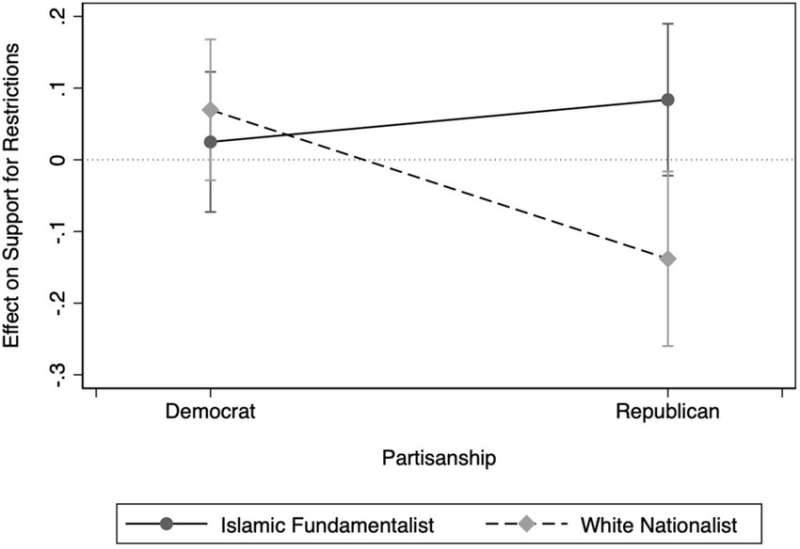Partisan viewpoints shape attitudes toward limiting civil liberties of suspected terrorists

What one person views as a major terrorist threat to the country, another may dismiss as a minor problem in society.
In the United States, that perspective can often be tinted by whether you're a registered Democrat or Republican. That's according to a new article titled "Partisanship and Support for Restricting the Civil Liberties of Suspected Terrorists" that appears in Political Behavior.
"The first thing that comes to a lot of people's minds if you just say the word 'terrorist' in the United States is Islamic fundamentalism or extremism," said Kevin Mullinix, associate professor of political science at the University of Kansas. "But when Democrats hear terrorism, they have other things like white nationalism coming to their minds."
Mullinix, who co-wrote the paper with Cora Caton, KU doctoral student in political science, argues that the social categorization of a suspected terrorist is consequential for civil liberty attitudes and that the effects are contingent on partisanship. For example, Republicans are far less likely than Democrats to constrain the civil liberties of white nationalists compared to unspecified suspected terrorists, their research found.
The authors said that their research isn't about which terrorist categorization is a bigger threat to society. It focuses more on uncovering the role of partisanship in shaping these threat perceptions.
"Partisanship is coloring people's perceptions of the threats associated with different individuals and groups in society. And then in turn we're seeing these pretty substantial differences between Democrats and Republicans and their willingness to restrict the civil liberties of various groups," Mullinix said.
In fact, unwavering partisanship may be damaging the nation's core values.
"It fundamentally changes our view of the world," he said.
"It's a pair of glasses we're all putting on that either have red or blue lenses, and it filters everything around us. These lenses are shaping who we see as a threat in society. So then we're willing to support the government monitoring people's phones without warrants in one situation but not do that in another one. Or support the government detaining people indefinitely in one situation and not in another."
Caton said, "Partisanship as a screen might color which groups you're seeing and not seeing as a threat. But part of that screen and that perception comes from the messages you're getting."
She explained partisans go to different sources, whether those are political leaders or media outlets. If Democrats hear their sources discuss white nationalists in terms of terrorism, it's treated as a serious issue. That same viewpoint is less frequently shared by conservative media and influencers.
The impetus for this research began when Caton noticed many liberal-leaning media outlets began using the label "white nationalist terrorism"—whereas conservative outlets and elites rarely discussed it in those terms, if they discussed it at all.
"I read a paper about the effect of threat perceptions of suspected terrorists on restricting civil liberties," Caton said. "But what they weren't accounting for in that study was essentially, "Who is that suspected terrorist?'"
To study this, the pair deployed question-wording experiments in four surveys. Three of the studies were composed of national samples implemented at different points in time. A fourth sample used a targeted sample of U.S. military service members.
The results yielded three conclusions: First, the effect of categorizing suspected terrorists as white nationalists for restricting civil liberties (like banning public speech, monitoring phones and holding indefinitely) was contingent on partisanship; second, the effect of the Islamic fundamentalist label was inconsistently moderated by partisanship across studies; third, the context in which the studies were implemented may have affected inferences.
That third conclusion is best illustrated by the events of Jan. 6, 2021.
"After the Capitol insurrection, we found the largest partisan differences in the effects of the white nationalist label in people's reactions," Mullinix said. "What it suggests is that while these group labels often matter, the extent to which they impact our attitudes and beliefs is altered by the context. If things change in the world around us, our threat perceptions can shift as well."
Mullinix is an expert in public opinion and public policy who has worked at KU since 2018. His past research has centered on wrongful convictions and police use of force. Caton specializes in researching terrorism, conflict and political behavior.
The researchers hope their study allows people to engage in a bit more self-reflection about how partisanship might be shaping their own views.
"Labels matter for people, specifically for whether they will support policies that restrict civil liberties," Caton said. "And how those labels matter depends on a person's partisanship. That's really important because civil liberties are largely regarded to be a cornerstone of democracy."
More information: Cora Caton et al, Partisanship and Support for Restricting the Civil Liberties of Suspected Terrorists, Political Behavior (2022). DOI: 10.1007/s11109-022-09771-9
Journal information: Political Behavior
Provided by University of Kansas





















